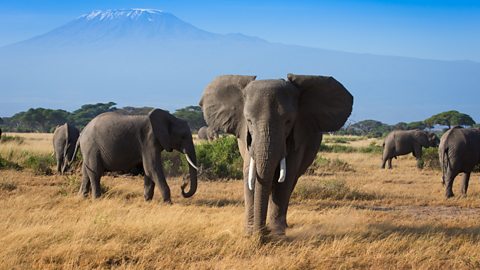Development in Kenya, Africa
Kenya lies along the Equator on the east coast of Africa, next to the Indian Ocean. The capital city is Nairobi. It has a population of over 46 million people. It is a very diverse population with over 40 ethnic groups including the Kikuyu, Luo and Maasai.
Kenya is an example of a low income country (LIC)Based on the World Bank's income classifications, a LIC has a gross national income (GNI per capita) of $1,045 or lower.. Gross National Income (GNI) is $1,290 per person compared to $42,000 per person in the UK. Life expectancy is 62 years and infant mortality 36 per 1,000. 75 per cent of the population live in rural areas, most are small scale farmers and most live in poverty.
There is a wide gap in income between people living in the drought-prone north-eastern lowlands, the highlands to the south-west, the coastal strip and the slum dwellers in Nairobi.
Impacts of tourism on the economy
Tourism in Kenya is vitally important to the economy. Low income countries (LICs) such as Kenya are keen to attract tourists to promote development. Kenya was one of the first LICs to develop its tourist industry. It is English speaking and this helped the launch of tourism. Over 1.3 million visitors travelled to Kenya in the peak year of 2011, spending ÂŁ600 million.

Attractions
Kenya has a hot climate and is located on the coast. Its safari parks, coral reefs and sandy beaches make it a very popular destination for tourists.
Positive effects of tourism
- Improved living standards, with more schools and hospitals.
- Foreign exchange allows purchase of imported goods.
- Infrastructure improved.
- Safari parks protect animals from poachers and can stop extinction of species.
- Local tribes are able to make money by selling handicrafts, eg the Maasai tribe.
Negative effects of tourism
- Jobs are low paid and temporary.
- Foreign multinational companies own 80 per cent of the hotels and travel companies, therefore most of the profits go back to richer countries.
- Nomadic tribes are forced to settle in order to get a job. Traditional ways may be lost in order to make a living.
- Game park buses cause soil erosion and alter the wild animals' behaviour.
- Hotels use a lot of water, which is a precious resource.
Sustainable tourism
Tourism has already reached a point of decline. Controversial presidential elections in 2007 followed by terrorist attacks in 2013 and 2014 caused a massive decline in visitors. Political instability, violent crime, harassment of tourists, over-commercialism of safari parks and environmental degradation have all discouraged many tourists from visiting the country.
The Kenyan government is now acting to try to halt the decline by:
- limiting the number of visitors to marine and game parks
- promoting sustainable tourism where visitors are in small groups
- using local people as guides
- limiting the height of coastal developments
- educating tourists to observe local customs